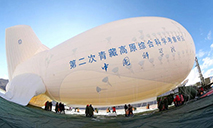Feature: U.S. border town braces for influx of migrants as partisan fights rage on
HIDALGO, Texas, the United States, May 17 (Xinhua) -- It's a scene most people would usually see in Mission: Impossible -- a helicopter hovers at low altitude above a roadside jungle; several officers search on foot along the bush edges with a dozen vehicles from multiple law enforcement agencies stopping by.
But for people living in Hidalgo, a county near the U.S.-Mexico border in the U.S. state Texas, the scene is commonplace -- it's the U.S. border guards hunting for assumed illegal migrants.
As the May 23 end of "Title 42" policy restricting border asylums over coronavirus concerns draws near, U.S. border cities and towns are bracing for a widely expected surge in migration though the White House decision is currently being challenged in court and in Congress.
There is no easy way out of the dilemma, especially during a midterm election year. Migrants are desperate, Republicans furious, while the Joe Biden administration blames the "broken" U.S. immigration system which has been "long overdue to be fixed," arguing that "Title 42 is not an immigration policy" but "a health authority."
"It was tough, tough, tough. Imagine it. The cold. The heat. The hunger ... Everything! My experience was super hard," Maria Mejia, a mother of four from El Salvador in Central America, told Xinhua in Spanish at the Humanitarian Respite Center run by a Catholic charity in McAllen, a border city north of Hidalgo.
Mejia left her hometown six months ago with her ten-year-old youngest son. It took them about one month on foot and by caravan to arrive in Mexican border city Reynosa, where they crossed the border and were expelled shortly afterwards. Since then, they had stayed at an encampment in Reynosa for five months before being allowed to enter the United States as asylum seekers days ago.
Long before the Title 42 policy was enacted in March 2020 when the coronavirus pandemic broke out in the country, each month there were tens of thousands of migrants like Mejia trying to cross the border from the Mexican side. The influx shrank during the pandemic but in March, though Title 42 remains in place, 210,000 migrants were arrested by U.S. border authorities, hitting a new high in the past 22 years.
"The illegal immigration will never stop because it's always going to be the same," Francisco Mejia, a Hidalgo resident, said in an interview with Xinhua, noting that most migrants come to America to escape poverty and violence.
"For them (migrants gathering at the Mexican side), it's very difficult that they aren't allowed to cross," sighed Sara Jimenez, a Mexican truck driver who regularly travels between Reynosa and Hidalgo via the McAllen-Hidalgo International Bridge.
"I was fortunate to have papers, and I remember getting to the middle of the bridge and seeing customs agents fighting and choking people trying to enter the U.S.," she told Xinhua.
However, the upcoming midterm elections have complicated the situation by fueling the fights between Republicans and Democrats as more migrants are expected to turn up around the U.S.-Mexico border. The New York Post reported on Tuesday that U.S. Border Patrol agents found six large groups each having at least 100 migrants in Texas' Starr County alone over the weekend.
In a quick response to the White House's move to wind down Title 42, Texas Governor Greg Abbott, a Republican seeking a third term in November, announced a series of measures earlier last month, including busing migrants to Washington, D.C. and more inspections at border ports.
The busing plan was called by the White House a "publicity stunt" and the governor had to end extra inspections resulting in a 10-day slowdown of trucks at the Texas border which cost the U.S. economy roughly 9 billion U.S. dollars according to an analysis by the Waco-based Perryman Group. It's estimated that Texas alone lost 4.23 billion dollars in gross product.
"Abbott is using the state's southern border as an expensive campaign prop, spending billions of tax dollars on harebrained policies that callously use migrants as political pawns and threaten to worsen inflation by snarling the flow of commerce into the U.S.," the El Paso Times said in an editorial last month.
However, Douglas Holtz-Eakin, president of the center-right American Action Forum, told AP that a change in U.S. immigration policy is unlikely, though the current immigrant worker shortage is contributing to supply chain bottlenecks and the highest inflation in 40 years in the country.
"The bases of both parties are so locked in," the economist observed.
Photos
 China’s central bank to issue commemorative coins on cultural theme of auspiciousness, including two heart-shaped coins
China’s central bank to issue commemorative coins on cultural theme of auspiciousness, including two heart-shaped coins Population of endangered black-headed gulls exceeds 10,000 mark in NE China’s coastal city of Panjin
Population of endangered black-headed gulls exceeds 10,000 mark in NE China’s coastal city of Panjin China's self-developed floating airship breaks record
China's self-developed floating airship breaks record Chinese germplasm bank conserves biodiversity in warm temperate zone
Chinese germplasm bank conserves biodiversity in warm temperate zone
Related Stories
- Venezuela confirms U.S. decision to ease oil sanctions
- Gun violence pandemic
- White Americans accountable for majority of hate crimes in U.S.: media
- Buffalo shooting latest example of targeted racial violence: U.S. News &World Report
- Bloody weekend in U.S. exposes authorities' inability to stop gun violence: The Guardian
Copyright © 2022 People's Daily Online. All Rights Reserved.






